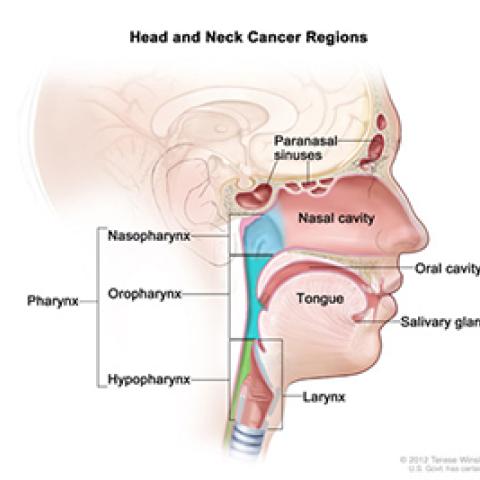
Head and neck cancer regions
Photo courtesy of NCI Visuals Online
Patients with recurrent head and neck squamous cell carcinoma may be eligible to participate in a new clinical trial at the NIH Clinical Center.
Mucous membranes are moist tissues that line body cavities such as the mouth and the upper airways. Head and neck squamous cell carcinoma (HNSCC) develops in the mucous membranes of the mouth, nose and throat. Vassiliki Saloura, M.D., Ph.D., of the Thoracic and GI Malignancies Branch, and Carter van Waes, M.D., Ph.D., of the National Institute of Deafness and Communication Disorders, are leading a study of the side effects and best dose of a novel radiosensitizer, birinapant, in combination with radiotherapy for patients whose HNSCC has come back at or near the place of the original tumor. Birinapant kills cancer cells by promoting signaling pathways that activate natural cell death. Intensity modulated re-irradiation therapy (IMRRT) aims thin beams of radiation of different intensities at the tumor from many angles. This type of radiotherapy reduces damage to healthy tissue near the tumor. Investigators are testing whether or not giving birinapant and IMRRT at the same time can be tolerated in patients and whether it can shrink tumors that have come back after previous radiation.
Clinicaltrials.gov identifier: NCT03803774
NCI Protocol ID: NCI-19-C-0041
Official Title: Birinapant and Intensity Modulated Re-Irradiation Therapy (IMRRT) for Locoregionally Recurrent Head and Neck Squamous Cell Carcinoma (HNSCC)
The Center for Cancer Research is NCI’s internal cancer center, a publicly funded organization working to improve the lives of cancer patients by solving important, challenging and neglected problems in cancer research and patient care. Highly trained physician-scientists develop and carry out clinical trials to create the medicines of tomorrow treating patients at the world’s largest dedicated research hospital on the campus of the National Institutes of Health in Bethesda, Maryland.
For more information on CCR clinical trials click here, and subscribe to have the latest CCR clinical trials sent directly to your inbox.